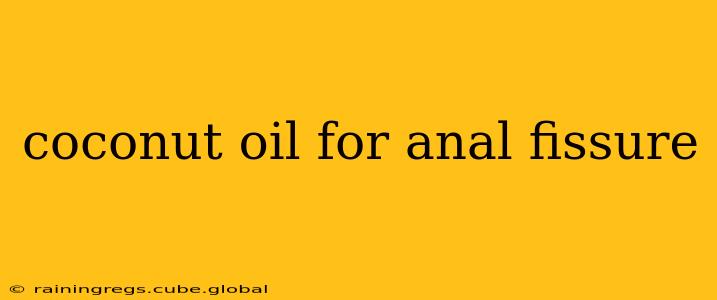Anal fissures, those painful tears in the lining of the anus, are a common and often uncomfortable problem. Many people seek natural remedies for relief, and coconut oil is frequently mentioned. But does it actually work, and are there any risks involved? Let's explore the evidence and provide a comprehensive overview.
Does Coconut Oil Help Heal Anal Fissures?
The idea behind using coconut oil for anal fissures is its purported anti-inflammatory and moisturizing properties. Coconut oil is rich in fatty acids, particularly lauric acid, which some believe can soothe irritated tissue and promote healing. However, there's limited scientific evidence directly supporting the use of coconut oil for treating anal fissures. While anecdotal reports suggest some relief from pain and discomfort, these are not substitutes for rigorous clinical trials. The moisturizing effect might offer temporary comfort by softening stools and reducing friction, but it doesn't address the underlying cause of the fissure.
How to Use Coconut Oil for Anal Fissures (If Choosing to Do So)
If you decide to try coconut oil, use a small amount of extra virgin, unrefined coconut oil. Apply it topically to the affected area after a bowel movement, ensuring the area is clean and dry. Gently massage a small amount into the skin surrounding the anus. Avoid excessive application, as this might irritate the already sensitive area.
Important Note: Always prioritize cleanliness to prevent infection. Wash your hands thoroughly before and after application.
What are the Risks of Using Coconut Oil for Anal Fissures?
While generally considered safe for topical use, coconut oil can pose some risks:
- Allergic reactions: Some individuals may experience allergic reactions, such as itching, rash, or swelling. If you notice any adverse reactions, discontinue use immediately.
- Infection: If not applied hygienically, coconut oil can increase the risk of infection.
- Delayed healing: Relying solely on coconut oil might delay seeking proper medical attention, potentially worsening the fissure.
Are There Better Treatments for Anal Fissures?
While coconut oil might provide temporary comfort, it's crucial to understand that it's not a cure for anal fissures. Many effective treatments are available, and consulting a doctor is essential for proper diagnosis and management. These treatments include:
- High-fiber diet and increased fluid intake: This helps soften stools, reducing strain during bowel movements.
- Topical medications: Your doctor might prescribe creams or ointments containing nitroglycerin or calcium channel blockers to relax the anal sphincter muscle and promote healing.
- Botox injections: These injections relax the anal sphincter muscle, relieving pressure and promoting healing.
- Surgery: In severe or persistent cases, surgery might be necessary.
What Causes Anal Fissures?
Understanding the causes of anal fissures is vital for effective treatment. Common causes include:
- Hard or infrequent stools: This is a major contributing factor, causing straining and tearing.
- Chronic diarrhea: Frequent loose stools can also irritate the anal lining.
- Childbirth: The trauma of childbirth can sometimes lead to anal fissures.
- Anal sex: Rough anal sex can cause anal fissures.
How Can I Prevent Anal Fissures?
Preventing anal fissures involves lifestyle changes that promote healthy bowel habits:
- High-fiber diet: Eat plenty of fruits, vegetables, and whole grains to prevent constipation.
- Adequate fluid intake: Drink plenty of water to keep stools soft and prevent constipation.
- Regular exercise: Regular physical activity promotes healthy bowel movements.
- Avoid straining during bowel movements: Listen to your body and don't force bowel movements.
Can Coconut Oil Cause Infection in Anal Fissures?
Yes, although coconut oil itself is unlikely to cause an infection, unhygienic application can significantly increase the risk. Contamination with bacteria during application can lead to infection, delaying healing and causing further complications. Always maintain impeccable hygiene before and after applying any topical treatment, including coconut oil.
What are the Best Home Remedies for Anal Fissures?
While coconut oil offers some anecdotal relief, the best home remedies for anal fissures focus on preventing constipation and promoting healing. This includes a high-fiber diet, increased fluid intake, warm sitz baths, and over-the-counter stool softeners. However, always consult a doctor if symptoms persist or worsen.
This information is for general knowledge and does not constitute medical advice. Always consult a healthcare professional for diagnosis and treatment of anal fissures. They can provide personalized recommendations based on your specific situation.
